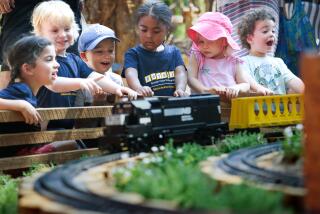‘Choo-Choo Inn’ : Conversion of an Old Railroad Depot Keeps a Bygone Era Alive
- Share via
WILKES-BARRE, Pa. — Old train stations never die. They become hotels and restaurants, and that’s what happened to the 107-year-old depot here where the railroad doesn’t run anymore.
Yet the sights, and even sounds, of railroad’s bygone days are still part of this northeastern Pennsylvania ex-coal town that no longer has the grimy image, and smell, of anthracite.
What was done in here, after the coal-hauling freights and coal-burning passenger trains stopped rolling, also happened in neighboring Scranton and down South in Chattanooga, where the stations became Hilton hotels.
Marvin Roth, a novelty and toy wholesaler who grew up a block from the depot and spent many happy hours watching the trains come and go, decided to re-create the busy rail terminal. He filled the tracks with dining, parlor and sleeping cars, cabooses and freights.
‘My Way of Keeping It Alive’
“I didn’t want the railroad to disappear entirely from Wilkes-Barre, and this is my way of keeping it alive,” he said of his $3-million, seven-acre project to convert the station. He paid $80,000 for the property in 1977.
The elegant brick Gothic station was last used by the Central Railroad of New Jersey, successor to the old Lehigh, Lackawanna, Delaware & Hudson, and Pennsylvania railroads that served the area into the early 1960s after Wilkes-Barre’s coal mines, flooded by the Susquehanna River, stopped operating.
Passenger rail service, which had begun here in 1843, ended July 1, 1963. The station fell victim to vandals and weather deterioration. It was so devastated in the 1972 flood caused by tropical storm Agnes that the Redevelopment Authority planned to raze it, even though it was listed as a national historic property until the Roth rescue.
“It was deserving of a better fate than a video game arcade, art gallery, boutique, or professional office building,” Roth said. “I bought it because I was infatuated with the building, and I made it my hobby. I never went into it as a money maker. It’s not a business. My wife, Jane, is in love with it, but my children think I’ve lost my mind.
“Initially, we thought only of restoring the station for a restaurant. Then we decided to add some rail coaches on the tracks outside, and I found four box cars, five coaches and two cabooses.”
Today there are more than 60 railroad cars on the site he named “Choo-Choo Inn,” and it provides 90 private rooms for overnight accommodations. More renovations will increase the sleeping space to a maximum of 120, or two suites to a car.
Tab for a night is less than $50, and Roth said “people love the overnight stay in the ambiance of our sleeping cars. It’s an experience they like to recount to their friends and relatives back home.”
The depot, called The Station, is used for dining and dancing. Its freight platform was converted into a tavern called “Gandy Dancer” after track workers, making it one of Wilkes-Barre’s most unusual night spots. Outside The Station entrance is an old red-and-white crossing watchman’s shanty and nearby a signalman’s tower. A side-tracked locomotive now and then sounds its whistle to reacquaint visitors with what used to be.
The Station is in a blighted, but developing, section of Wilkes-Barre. Some lots are vacant. But an old brewery being converted into a festival mart is across the street and nearby the federal government plans to build a new Social Security Administration regional headquarters.
Finding old railroad cars was easy, but getting them into Wilkes-Barre, where track had been torn up, was difficult.
“We had to lay track from the site to some freight lines still operating,” Roth said. “That’s how we were able to move a private coach once used by Henry Flagler, the owner of the old Florida East Coast Railway and a partner of John D. Rockefeller.
“Today that car sits next to another private coach once owned by Helen Gould, the daughter of financier Jay Gould, who more than half a century ago controlled the greatest rail empire in the world.”
Lavishly Furnished Cars
Both lavishly furnished cars, fitted with antiques that Roth collects, are used by guests of The Station for private dinners.
Roth has also acquired eight yellow refrigerator cars, and he plans to convert them into small boutiques and shops.
Roth has turned his novelty business over to his son, Phillip, so he can devote full time to his standstill railroad. He is filling the inside of The Station with Victorian treasures.
“What my wife has tried to do is de-emphasize the railroad theme in the restaurant area and play up the Victorian setting,” he said. “It is replete with antiques we pick up in our travels . . . .”
“It is primarily Americana, with a little bit of French and British here and there, mostly from the 1800s. Really, what we have here is a step into the past.”
More to Read
Sign up for Essential California
The most important California stories and recommendations in your inbox every morning.
You may occasionally receive promotional content from the Los Angeles Times.













